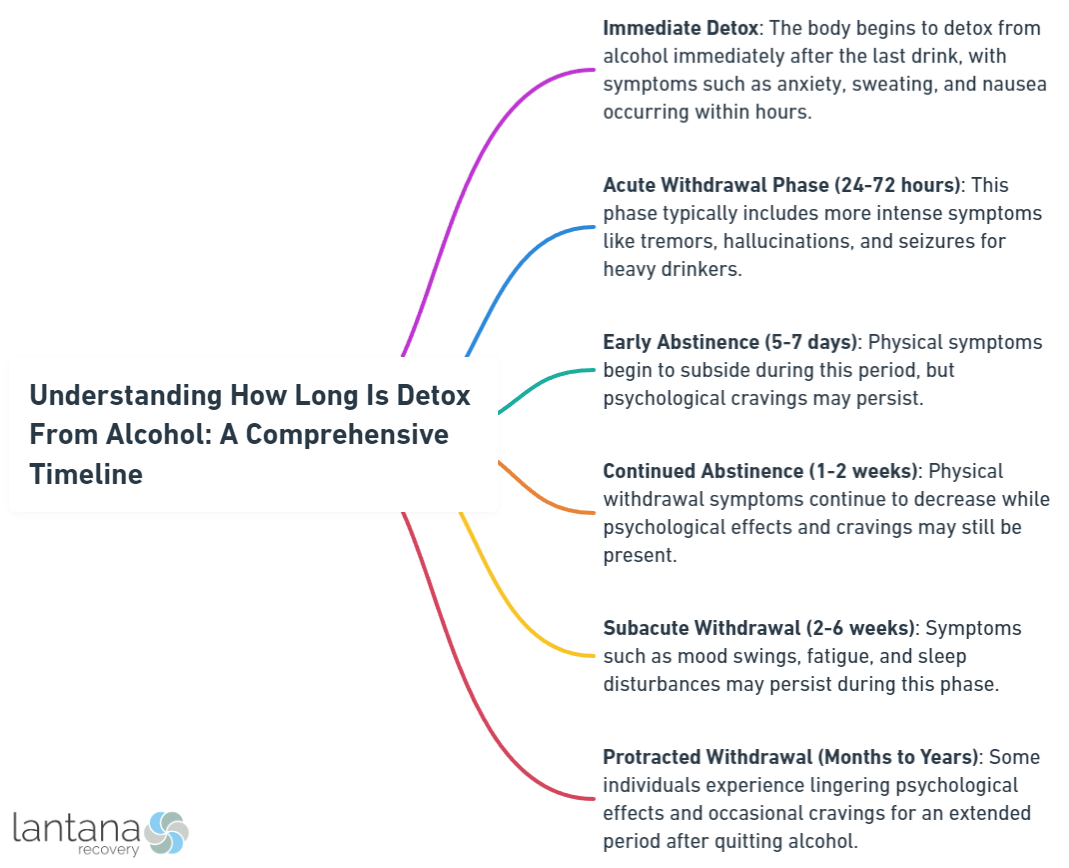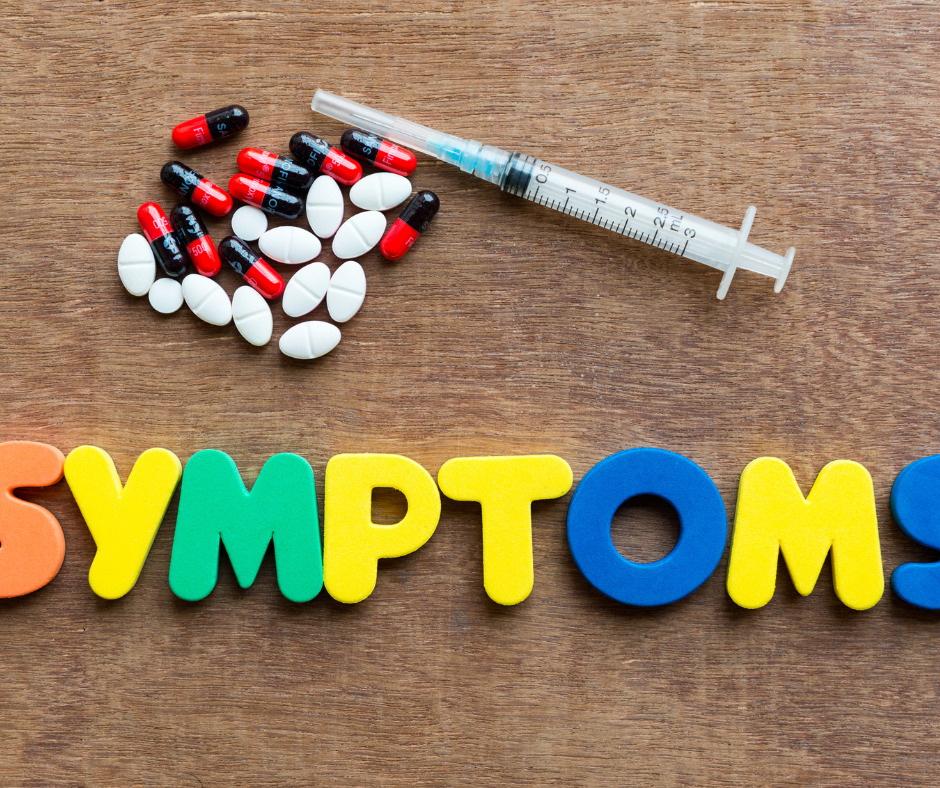Detox from alcohol can differ from person to person, but general timelines estimate that withdrawal symptoms start within six hours after the last drink, peak around 24 to 72 hours, and taper off within four to five days. This article will explore the details of the detox process, what can affect its length, and what to anticipate at each stage, while answering the question: how long is detox from alcohol?
Key Takeaways
- Alcohol detox is a complex and potentially dangerous physiological process which requires medical supervision to manage withdrawal symptoms safely, especially for individuals with a history of heavy alcohol consumption.
- The duration of alcohol detox varies depending on individual factors such as age, gender, overall health, and severity of Alcohol Use Disorder, with symptoms ranging from mild to severe and potentially life-threatening conditions like delirium tremens.
- Treatment options for alcohol detox include medications like benzodiazepines and naltrexone, and may take place in inpatient or outpatient settings depending on the individual’s condition, with ongoing support being crucial for long-term recovery.
The Alcohol Detox Process
Alcohol detoxification, or alcohol detox, is the physiological process of purging alcohol from the body. It’s a vital step for individuals like John, who are seeking to break free from the clutches of alcohol addiction. But this process is not without its trials, as it can trigger a variety of withdrawal symptoms, from mild headaches to severe conditions like delirium tremens. These symptoms can surface as early as a few hours after the last drink and may include:
- shaking
- nausea
- irritability
- anxiety
- sweating
- insomnia
- hallucinations
- seizures
To detox from alcohol, one must undergo the alcohol detox process and face the challenges that come with it.
These symptoms can amplify in intensity over time.
At this point, medical professionals become indispensable. In much the same way a mountaineer requires a guide to traverse dangerous terrains, those undergoing alcohol detox need medical supervision to safely traverse withdrawal symptoms. Effective management of the variety and severity of withdrawal symptoms—which can escalate rapidly, necessitating urgent medical intervention—depends on this medical oversight.
Importance of Medical Supervision
Medical supervision during alcohol detox is like a safety net, preventing serious complications, monitoring the patient’s health, and alleviating discomfort, especially for individuals with a history of alcohol abuse. Potential complications that could occur during alcohol detox without medical supervision are seizures, delirium tremens, and even neuropsychiatric disorders. The risk of severe withdrawal symptoms is higher for individuals with a history of heavy alcohol consumption.
Medical professionals, including doctors, nurses, and addiction specialists, take on the mantle of supervising the alcohol detox process. Their role is akin to a lighthouse, guiding individuals on their journey to sobriety and ensuring they steer clear of potential dangers.

Stages of Alcohol Detox
Much in the same way a journey of a thousand miles commences with a single step, the road to sobriety begins with the onset of early withdrawal symptoms just a few hours after the last drink. This journey progresses to peak withdrawal symptoms such as tremors, hallucinations, and seizures occurring within 24 to 72 hours. Finally, the path leads to the subsiding of symptoms, which can take several days to a week.
The timeline of alcohol detox is a roller coaster of symptoms. The peak withdrawal symptoms typically last between 24 and 72 hours, and the complete resolution of symptoms usually occurs over the course of four to five days. During this time, individuals may experience moderate withdrawal symptoms such as hand tremors, disorientation, and seizures.
Throughout the alcohol detox process, the body may exhibit a range of symptoms including anxiety, tremors, sweating, nausea, vomiting, headache, insomnia, and an elevated heart rate.
How to Get Help with Alcoholism
To effectively get help with alcoholism, individuals should acknowledge their struggle and seek professional support. This can involve consulting healthcare professionals, joining support groups like Alcoholics Anonymous, or engaging in alcohol rehabilitation programs. Tailored treatment plans often combine therapy, medication, and peer support to facilitate recovery.
Factors Affecting Alcohol Detox Duration
The duration of alcohol detox, akin to the journey itself, varies from person to person. It can be influenced by individual factors such as age, gender, and health, emphasizing the personalized nature of the detox process. For example, while age might influence the intensity of withdrawal symptoms, a direct correlation with the duration of symptoms has not been definitively established. Current research on gender differences in alcohol detox duration suggests that men may experience more withdrawal symptoms than women but does not conclusively define the duration of detox.
Moreover, the overall health status of an individual has a substantial influence on the alcohol detox process. Healthier individuals may have milder and shorter-lasting symptoms, whereas those with poorer health may experience more prolonged and intense withdrawal symptoms.
Individual Factors
Individual factors such as age, gender, and overall health significantly affect the alcohol detox process. Here are some key points to consider:
- Individuals aged 60 years and above are more susceptible to experiencing more severe alcohol withdrawal symptoms.
- Gender also plays a significant role, with males being more likely to experience symptoms such as delirium tremens and seizures.
- Men with alcoholism tend to report more withdrawal symptoms when compared to women.
The overall health of an individual also impacts the duration of alcohol detox. Individuals with severe alcohol dependence or underlying health conditions may require extended medical supervision during detox, as solitary detoxification can pose significant risks.
Severity of Alcohol Use Disorder
Moreover, the detox process is heavily influenced by the severity of the alcohol use disorder (AUD). AUD is categorized as mild, moderate, or severe depending on the fulfillment of specific criteria, such as:
- the frequency and quantity of alcohol consumption
- the duration of alcohol use
- genetic predisposition
- co-occurring mental health disorders.
Individuals with a more severe disorder may encounter more intense and potentially hazardous withdrawal symptoms, emphasizing the importance of medical supervision and support during detox. Potential risks include seizures, delirium tremens, and Wernicke-Korsakoff syndrome.
Alcohol Withdrawal Symptoms: From Mild to Severe
Alcohol withdrawal symptoms can fluctuate from mild to severe, akin to the varying intensity of a gentle stream to a raging torrent. Those who experience alcohol withdrawal symptoms can include common mental and physical symptoms like headaches, anxiety, and irritability, which typically begin to appear within eight hours following the last alcoholic beverage consumed.
Symptoms such as anxiety, headaches, irritability, disorientation, hand tremors, and, on the second day, hallucinations and panic attacks are some of the mild and moderate symptoms that may occur during the first few days of alcohol detox. On the other hand, severe withdrawal symptoms, including hallucinations, seizures, and conditions like delirium tremens, can occur as early as six hours after the last drink in heavy drinkers. This gamut of symptoms necessitates immediate medical attention to ensure safety and proper management.
Mild Symptoms
The initial symptoms of alcohol withdrawal can be considered mild, including headaches, anxiety, and irritability. Alcohol withdrawal typically begins within eight hours following the last alcoholic beverage consumed, with these mild symptoms reaching their peak within a 24-72 hour time frame and then resolving within 4-5 days.
Absolutely, mild symptoms like anxiety, headaches, and irritability are frequently observed in people undergoing alcohol detox.
Moderate Symptoms
As the alcohol detox process proceeds, individuals may experience moderate symptoms. These can include disorientation, hand tremors, and seizures. Hand tremors during alcohol withdrawal are attributed to the reduction in chloride flux due to the loss of GABA-A receptor stimulation. Additionally, the lack of inhibition of the NMDA receptors may also play a role in the development of tremors.
The triggering of seizures during alcohol withdrawal is primarily due to the occurrence of generalized tonic-clonic seizures, which are considered the most dramatic and dangerous aspect of the alcohol withdrawal syndrome. Disorientation, on the other hand, is a state of confusion and altered mental status that may occur during the withdrawal process. It’s important to note that moderate symptoms of alcohol withdrawal can occur intermittently.
Severe Symptoms

The severe symptoms of alcohol withdrawal are like storm clouds on the horizon of the detox process. These symptoms can encompass:
- hallucinations
- delirium tremens
- seizures
- high blood pressure
- rapid heart rate
- fever
- agitation
- confusion
- severe anxiety
- tremors
- sweating
- nausea and vomiting
Delirium tremens (DTs) pose a significant risk to life during alcohol detox, carrying a potential mortality rate of up to 37% in the absence of professional intervention.
Hallucinations during severe alcohol withdrawal are a result of alcohol-induced imbalances in brain chemistry, which lead to excessive neuronal activity when alcohol is withheld.
Typical Alcohol Detox Timeline

The process of alcohol detox generally adheres to a typical timeline. This timeline begins with minor withdrawal symptoms generally starting approximately six hours following the last drink, and an individual with a prolonged history of heavy drinking may experience a seizure six hours after ceasing alcohol consumption.
This timeline then proceeds to the peak phase, with individuals likely to experience withdrawal symptoms typically lasting between 24 and 72 hours. The complete resolution of symptoms usually occurs over the course of four to five days.
Individuals with an extensive history of alcoholism may indeed experience severe withdrawal symptoms, which can be more severe than those encountered by others.
Initial Phase (6-24 Hours)
The initial phase of alcohol detox can be compared to the calm before the storm. During this phase, which lasts from 6 to 24 hours, withdrawal symptoms begin to appear, varying in intensity from mild to severe. Typical withdrawal symptoms encountered during the initial stage of alcohol detox include:
- anxiety
- shakiness
- sweating
- nausea
- vomiting
- insomnia
- headache
The severity of withdrawal symptoms in the initial phase is assessed using the CIWA-Ar scale, which classifies the severity of withdrawal based on the score.
In the case of minor withdrawal, the symptoms generally reach their peak at 18 to 24 hours.
Peak Phase (24-72 Hours)
The peak phase of alcohol detox is like the heart of the storm. It’s characterized by the most intense and potentially life-threatening levels of withdrawal symptoms, including severe physical symptoms like anxiety, tremors, sweating, nausea, vomiting, headache, increased heart rate, and high blood pressure, as well as psychological symptoms such as neuropsychiatric issues and sleep disturbances.
Standard medical interventions during the peak phase of alcohol detox may involve the use of benzodiazepines to address severe withdrawal symptoms like hallucinations, seizures, or delirium tremens. However, life-threatening complications, including seizures, delirium tremens, Wernicke-Korsakoff syndrome, and other neuropsychiatric complications, may require immediate medical attention.
Resolution Phase (72 Hours Onwards)
As the storm of alcohol detox begins to subside, individuals enter the resolution phase. This phase, which commences 72 hours after the last drink, is marked by a gradual reduction in withdrawal symptoms. Nevertheless, some individuals may experience lingering symptoms that could endure for months or even years.
In the resolution phase of alcohol detox, typical persistent symptoms may encompass:
- shaking
- irritability
- nausea
- occasionally seizures
Recommended medical interventions during the resolution phase may include the use of medications as adjuncts to a benzodiazepine regimen, with diazepam, chlordiazepoxide, and lorazepam being the best-studied options for alcohol withdrawal treatment.
Post-Acute Withdrawal Syndrome (PAWS) encompasses a range of enduring withdrawal symptoms that may persist beyond the acute phase. These symptoms are addressed through:
- Therapy
- Support groups
- Medication
- Lifestyle adjustments
Treatment Options for Alcohol Detox
Treatment options for alcohol detox, akin to a survival kit’s tools, are designed to help navigate the tumultuous storm of withdrawal symptoms. These options include the use of medications such as:
- Benzodiazepines
- Haloperidol
- Beta blockers
- Clonidine
- Phenytoin
In addition to these medications, other treatment options may also be utilized.
The appropriate setting for the treatment of alcohol withdrawal symptoms is an inpatient setting such as a detox program or rehab facility offering 24-hour medical supervision and support. Outpatient detox programs are also available, allowing individuals to undergo alcohol detoxification at their residence while receiving regular check-ins from medical professionals for continuous support and supervision.
Medications

During alcohol detox, medications assume a vital role in the management of withdrawal symptoms. These include benzodiazepines, naltrexone, and acamprosate. Acamprosate is a prescribed medication aimed at alleviating symptoms of post-acute withdrawal syndrome (PAWS), diminishing alcohol cravings, and facilitating the restoration of normal brain function following cessation of alcohol consumption.
Naltrexone is another medication that plays a crucial role in alcohol detox by mitigating the urge to drink through the blockade of alcohol’s euphoric effects. This attribute is especially valuable during the detox phase and in the prevention of relapse. Naltrexone is available in two forms for treating alcohol dependency: an oral tablet and a longer-acting injectable form.
Inpatient vs. Outpatient Detox
Inpatient and outpatient detox programs, while different, each come with their own unique advantages. Inpatient detox programs provide round-the-clock medical supervision and assistance, while outpatient detox programs enable detoxification at home with regular appointments with healthcare providers. Inpatient detox programs offer a controlled environment, leading to increased success rates, and immediate access to healthcare and mental health professionals for support. However, they may require an extended absence from personal responsibilities such as work or family, and they can be more expensive compared to outpatient options.
Outpatient detox programs provide:
- Flexibility
- Enable the continuation of daily responsibilities
- Promote the development of life management skills and support networks
- Enhance personal privacy.
The Importance of Ongoing Support

Ongoing support serves as a guiding light, leading individuals towards long-term recovery from alcohol addiction. It includes rehabilitation programs, support groups, and counseling.
Rehabilitation Programs
Acting as a compass, alcohol addiction treatment programs guide individuals on their journey towards sobriety. They offer a secure and encouraging setting for individuals to go through alcohol withdrawal, providing medical supervision, counseling, and support to effectively manage withdrawal symptoms and minimize potential complications. These programs utilize therapies like behavioral therapy, cognitive-behavioral therapy (CBT), motivational interviewing, family therapy, and support groups. They also integrate educational components to promote responsible drinking behavior, educate about the risks of certain drugs, and provide knowledge and understanding of addiction and recovery.
Furthermore, they emphasize the development of relapse prevention strategies and provide guidance on stress management, building a support network, and making healthier choices.
Support Groups and Counseling
For those battling alcohol addiction, support groups and counseling sessions offer a safe haven. They offer a sense of community, understanding, accountability, and encouragement, helping individuals learn coping strategies and gain insights from others who have successfully undergone detox and are maintaining sobriety. Substance abuse counselors play a crucial role in providing support, guidance, and therapy to individuals during alcohol detox. They assist in:
- Developing coping strategies
- Addressing underlying issues
- Educating about addiction and recovery
- Creating relapse prevention plans
Regular participation in groups such as Alcoholics Anonymous and other counseling sessions creates a supportive network that facilitates sharing experiences and provides accountability, which is vital for a successful recovery process.
How to Help an Alcoholic in Denial
Understanding how to help an alcoholic in denial requires patience and empathy. It’s important to communicate concerns calmly and non-confrontationally, providing specific instances of how their drinking behavior is harmful. Encouraging them to seek professional help, while avoiding enabling their alcohol use, is key. It’s also vital to seek support for oneself when dealing with this challenging situation.
Summary
In conclusion, understanding the alcohol detox timeline is crucial for anyone embarking on the journey to sobriety. The path can be challenging with a spectrum of withdrawal symptoms from mild to severe. However, with the right tools such as medical supervision, medications, inpatient or outpatient detox programs, and ongoing support from rehabilitation programs, support groups, and counseling, long-term recovery from alcohol addiction is possible. It’s a journey worth undertaking, and remember, the storm doesn’t last forever.
Frequently Asked Questions
How long does it take to get rid of all the alcohol in your body?
It takes about 25 hours for your body to get rid of all the alcohol.
How long does it take for your liver to detox?
It typically takes seven days for the liver to detox, but it may take a couple of months for symptoms to disappear completely. For alcohol detox, medical supervision is recommended to help manage symptoms effectively.
Is alcohol worse than smoking?
Smoking is certainly worse than drinking, as there is no benefit to tobacco use at any level, unlike alcohol at low or moderate levels. Smoking can cause cancer and artery damage.
What is the importance of medical supervision during alcohol detox?
Medical supervision during alcohol detox is crucial to effectively manage withdrawal symptoms and provide urgent medical intervention if necessary.
What are the stages of alcohol detox?
Alcohol detox involves early withdrawal symptoms, peak withdrawal symptoms, and the subsiding of symptoms, which can take several days to a week. This process typically starts within a few hours after the last drink and peaks within 24 to 72 hours.









